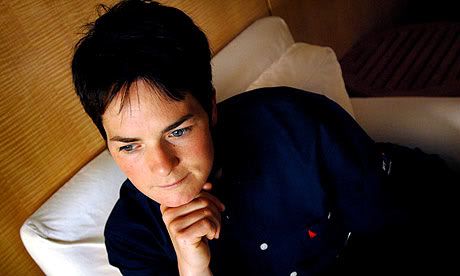
After writing about a Green British rower, here is a Green British Sailor.
Dame Ellen MacArthur is retiring from competitive sailing to concentrate on environmental campaigns. Speaking on BBC Radio 4's Desert Island Discs, Dame Ellen, who broke the speed record for solo circumnavigation of the globe in 2005, said a trip to the Atlantic island of South Georgia had made her acutely aware of the challenges facing the planet.
"The more I researched into it, the more frightened I got and that has really scared me to the point that I can't go back to sea and go around the world again because this really matters," she said.
Dame Ellen MacArthur
Why are you interested in sustainability?
"One big challenge which I'm really driving forward, overlaid on all our projects, is one of trying to figure out how to live and work in a more sustainable way.
The winter before last I was given the chance to spend some time in Antarctica and it was just incredible. Visiting such a remarkable place made me stop and take in what was around me and reflect on my experiences and all that I have seen in a decade of life on the ocean. It was a stark reminder to me of just how important such wild and virtually untouched places are and how we need to look after them to ensure that they survive in the future. It also made me realise how vastly different life is there compared to life back home in our heavily consumerist society.
I am as guilty as anyone of consuming the planet's resources in an unsustainable way, including lots of travel and not all using just the wind! The big challenge I, and we as a company, have is working out how to continue to develop, evolve and do exciting and rewarding projects in a way which is much more sustainable.
On the boat, when you leave for a record, you take the absolute minimum with you. You manage what you have down to the last drop of fuel or water, and if you run out there is no way you can stop for more! At sea even money has absolutely no value, it's your resources that count. It's a very different world.
You are so careful never to leave the computer screens or the lights on. You know exactly how much diesel you need per day and you monitor your batteries and consumption as if they were the boat’s heart rate. This attention to detail, to avoidance of waste, to using every element of the resource available is definitely in my blood – I have to thank my parents for bringing me up to appreciate this – and I’ve definitely managed to put this to competitive advantage in the way it's helped me manage my race boats out on the ocean. The contrast of this with life on land in the Western world has made me think hard. There is a chasm of difference between the two. Investigating, and understanding this better has become a passion for me. To learn, to improve and to share this journey is my big goal for the coming years."
So what are you going to do about it and aren't you just jumping on the bandwagon?
"This attention to detail, to avoidance of waste, to using every element of the resource available is nothing new for me and is definitely in my blood. I was lucky that I grew up on a small holding where we grew our own vegetables, we had fruit on the trees around us, ducks and chickens in the yard outside and were fairly self sufficient in having land around us. We threw little away, were taught not to waste things, we bought in bulk to save money, and led, I would say, a fairly simple, sustainable life and one that I value immensely. I have to thank my parents for bringing me up to appreciate this – and I’ve definitely managed to put this way of thinking to competitive advantage in the way it’s helped me to manage resources on my raceboats out on the ocean.
Now I am becoming more and more aware of the increasing importance of living as sustainably as possible, I am trying to learn more and more about it and to make changes in both my personal and professional life where I can.
At home, I am researching into various types of renewable energy. In the office, we have recently conducted an energy survey and will be putting a number of suggestions into practice and for the boats, we are looking at biodiesel, the possible use of fuel cells and continuing our use of solar panel options.
As long ago as 1999, I crossed the Atlantic using biodiesel and 2 years ago, used a hydrogen fuel cell.
The more questions I ask, the more I realise that there is a lot of confusion about this whole area. I would like to try to unravel this and to find out the truth about what can be done practically to really make a difference. I am not just paying lip service to wanting to live a sustainable lifestyle, I want to learn, to improve and to share this journey to a more sustainable future with others.
This is one of my main goals and hopes for the coming years"
Guardian
E.ON
E.ON






No comments:
Post a Comment